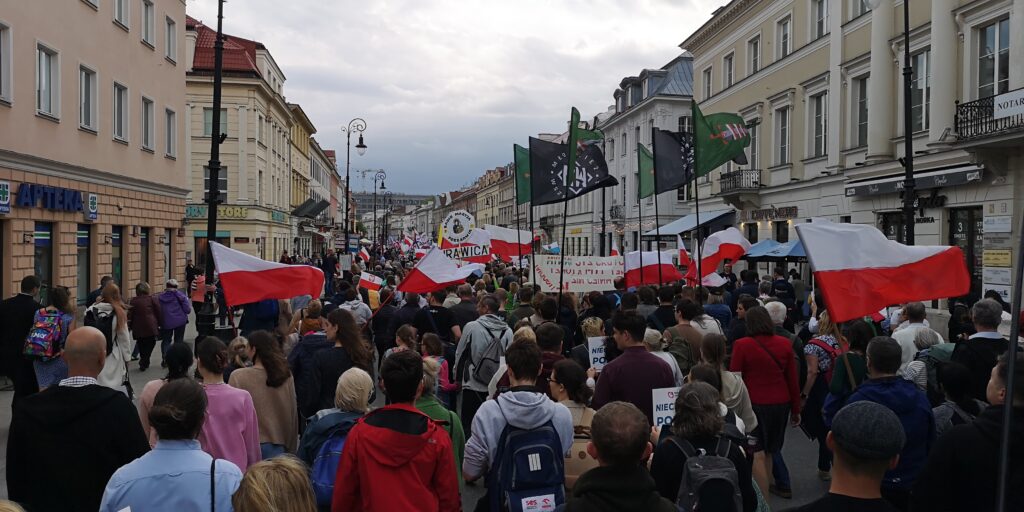Authored by Olivier Bault, from the Ordo Iuris Institute
The battle for the right to life is on in Poland, and the success of the National March for Life in Warsaw last Sunday shows that the country of Saint John Paul II remains an exception in today’s Europe, even when it has a very left-liberal, pro-EU government. This was one of the biggest pro-life marches ever in the Polish capital, and the crowd, albeit very different, was no less numerous than during the biggest of the pro-abortion “black protests” in late 2020, after the country’s Constitutional Tribunal had banned abortion based on a baby’s prenatal abnormality or serious illness. I was at both, and the first part of both marches’ itineraries were identical, which made comparison easier.
Sunday’s big march was preceded by a day of protest action in front of the Sejm (the lower house of the Polish parliament) on Thursday, April 11, when four bills proposed by the ruling coalition to make abortion on-demand legal in Poland were being discussed in the first reading. From 8 a.m. that day, a “voice of the unborn” bell stood on the sidewalk in front of the parliament building. Passers-by could ring the bell, which was then heard, including inside parliament, as “the voice of those who cannot speak.”

Then, a press conference was held early in the afternoon by several pro-life organizations — the Ordo Iuris Institute, which is a lawyers’ organization, the Father Piotr Skarga Association (Stowarzyszenie im. ks. Piotra Skargi), the Center for Life and Family (Centrum Życia i Rodziny), the Association of Catholic Doctors (Stowarzyszenie Lekarzy Katolickich), the Yes to Life (Życiu Tak) foundation, and the Pro–Right to Life (Pro – Prawo do Życia) organization, which is known for its use of very realistic and crude photographs of aborted children. This last organization later organized a protest march from the Saint Cross Basilica, where a mass had been held, to the Sejm, with a few thousand participants, which is quite a lot for a protest that started at 5 p.m. on a weekday.
The big National March for Life that took place on Sunday was organized by yet another group of pro-life organizations (the Saint Benedict Foundation and the Coalition for Life and Family) with the support of the Catholic episcopate. Another big march against abortion, the March for Life and Family, is set to take place on June 16 in Warsaw and Cracow, alongside other cities and towns. More protest marches will take place on different dates in dozens of locations to keep the pressure on MPs.
The organizers of the April 11 protest actions rejoice at the fact that their pressure ensured that in the opposition ranks, among Law and Justice (PiS) and Konfederacja MPs, few abstained and even fewer supported, including the bill that is, at least in appearance, the less radical of the four, and which got the largest support when the voting took place the day after, on Friday the 12th. It is the bill tabled by Third Way, an alliance of two center parties, including the agrarian PSL party, which has a number of MPs in its ranks who are opposed to liberalizing abortion. All four bills have now been sent to a special parliamentary committee, where they will be further discussed.

Out of the four, three would make abortion on-demand legal in Poland up to the 12th week of pregnancy, with the possibility to have an abortion at a later stage in case of the unborn child’s abnormality or incurable illness (up to the 24th week in case of a minor illness and up to the end of pregnancy in case of serious illness). The Third Way’s bill does not provide for abortion on demand but would in fact make it possible in two ways: by allowing the use of abortion pills at home and by extending the existing possibility to abort in case of a danger to a woman’s health or life to cases that include mental health threats.
All four bills are unconstitutional not only in view of the Polish Constitutional Tribunal’s 2020 ruling but also of its jurisprudence since 1997, when it invalidated an attempt by the then-ruling post-communist left-wing coalition to allow for abortion in case of socio-economic difficulties of the mother on the same year a new constitution was adopted.
At the time, Poland’s Constitutional Tribunal clearly stated that the protection of the right to life, which is enshrined in the constitution, should be considered to start at the moment of conception, as there is no other moment in a person’s prenatal development which can be objectively defined as the beginning of life.
Interviewed last week about the constitutionality of the bills, Professor Andrzej Zoll, who was president of the Constitutional Tribunal in 1997 and has taken sides with the liberals in recent years on the issue of the rule of law, said that in his view, any kind of legalization of abortion on-demand would be unconstitutional and that even the practice of allowing for abortions when unborn children were diagnosed with Down syndrome, which were the most frequent cases allowing for abortions in Poland until the year 2020, was also clearly in breach of Poland’s Constitution.

The Ordo Iuris Institute, too, considers that all four bills tabled by the Left, Third Way, and Donald Tusk’s Civic Platform are unconstitutional and, as such, should have been rejected on the first reading.
Meanwhile, on the very same day this heated debate took place in the Polish Sejm on April 11, the European Parliament adopted a resolution calling on Poland and Malta to make abortion legal and on the whole EU to enshrine a right to the prenatal killing of children in the EU Charter of Fundamental Rights. This “Resolution on including the right to abortion in the EU Fundamental Rights Charter” was adopted by a majority of 336 votes, with 163 against and 39 abstentions (out of 705 members of the European Parliament).
Funnily enough, just like the Polish Left’s abortion bill, the European Parliament’s resolution talks of pregnant “persons” instead of pregnant “women” in a bow to their shared gender ideology. According to the European Parliament, for example, “people’s ability to exercise their reproductive autonomy… is essential to the full realization of human rights for women, girls, and all persons who can be pregnant.” Hence, the MEPs’ condemnation of “the restriction of access to abortion care in Poland.”
It is unlikely abortion will be made legal before the next presidential election in Poland next year, as President Andrzej Duda has clearly stated his intention to veto any of the four abortion bills that will be voted by parliament into law and the ruling coalition does not have the three-fifths majority required to overrule a presidential veto. Even if passed by parliament after a change of president, such a law will be unconstitutional and subject to being invalidated by the Constitutional Tribunal.
In that situation, it is striking to see this very same European Parliament, which for years had been demanding that the previous conservative majority in Poland abide by the country’s constitution and respect all of its constitutional court’s rulings, now demands that it violate the Polish constitution and make laws that are in blatant breach of several major rulings of the Constitutional Tribunal that have been issued in the last quarter of a century.





